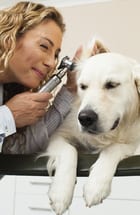Senior Pet Care
 Older cats and dogs may have somewhat different care needs than they had when they were young. As with humans, although a comfortable and long life can never be guaranteed, certain measures of senior care can be helpful in maintaining health and longevity. While life spans vary, cats are generally considered to be seniors when they reach 8 to 10 years of age. Because dogs' life expectancies cover a wide range depending on breed, dogs are usually considered seniors when they are within 25 percent of the life expectancy for their size or breed.
Older cats and dogs may have somewhat different care needs than they had when they were young. As with humans, although a comfortable and long life can never be guaranteed, certain measures of senior care can be helpful in maintaining health and longevity. While life spans vary, cats are generally considered to be seniors when they reach 8 to 10 years of age. Because dogs' life expectancies cover a wide range depending on breed, dogs are usually considered seniors when they are within 25 percent of the life expectancy for their size or breed.
Small-breed dogs have a longer life expectancy than large breeds with Great Danes living on average 7 to 9 years and miniature poodles living on average 12 to 14. Indoor cats normally live longer than cats that are permitted outdoors, with feral cats dying the youngest of all due to malnutrition, disease and accidents. Indoor cats live an average of 15 years and many live 18 or 20 years, while feral cats usually live only 6. Responsible home care and regular veterinary checkups go a long way to keeping any pet healthy and ensuring as long a life as possible.
Diets for Senior Pets
As pets age and their activity level decreases, they require less food, so their weight should be monitored. Older dogs and cats are less mobile, both because of a slowing metabolism and because of mobility issues, such as arthritis. Being overweight only exacerbates their condition. The veterinarian, therefore, may recommend that they be fed a lower calorie diet.
Of course, it is still necessary to maintain their nutritional health, and any unexplained weight loss should be investigated since it may be indicate serious medical problems, such as heart, liver or kidney disease or dental infection.
Supplementary fatty acids may be helpful for older pets. Animals with certain conditions, such as heart of kidney disease, may be put on low-sodium diets or diets that adjust their electrolyte balance. Dietary supplements, like glucosamine and chondroitin, may be administered to benefit pets with joint problems.
Veterinary Checkups for Senior Pets
Dogs and cats of all ages should be examined annually by a veterinarian. This is especially important for older pets as they are more prone to disease processes associated with aging. In addition, because their senses of hearing, vision and smell diminish, they may be more prone to accidental injury. Veterinarians may recommend semi-annual checkups for older pets.
During a veterinary examination of an older animal, tests may be taken for problems more common as pets age. The doctor will be carefully monitoring:
- Weight
- Blood chemistry
- Stool and urine
- Heart, liver and kidney function
- Blood pressure
- Thyroid hormone levels
- Dental health
- Eye and ear health
In older pets, dental cleaning is extremely important and a dental scraping may be required more frequently. If heart disease is suspected, an electrocardiogram (EKG) may be part of the checkup.
Behavioral Changes in Senior Pets
 Older cats and dogs are normally less energetic than they once were. It is natural for them to sleep more and be less tolerant of extreme temperatures. Due to the changes experienced with aging, such as stiffness or pain in the joints, weak sphincter muscles, diminished sensory capacities or cognitive changes, pets may:
Older cats and dogs are normally less energetic than they once were. It is natural for them to sleep more and be less tolerant of extreme temperatures. Due to the changes experienced with aging, such as stiffness or pain in the joints, weak sphincter muscles, diminished sensory capacities or cognitive changes, pets may:
- Be less playful
- Tire more easily
- Have trouble rising or climbing stairs
- Have difficulty getting into the car
- Be uncharacteristically cranky or aggressive
- Be more withdrawn
- Urinate or defecate in inappropriate places
Aging dogs and cats may be less able to adapt to new surroundings and may be experience more anxiety being boarded or groomed.
Special Accommodations for Senior Pets
Some accommodations that will make your older cat or dog more comfortable include:
- Brushing the teeth or supplying dental treats
- Ensuring that the animal gets proper exercise
- Keeping the pet from extremes of temperature
- Providing appropriate nutrition
- Administering supplements and medications as needed
- Providing softer bedding as necessary
- Handle the animal more carefully
For older dogs, a bare floor may be slippery to navigate and stairs may become impossible to climb. Rugs or carpeting and ramps may make life easier. For both dogs and cats, it is very important that extreme temperatures be avoided, particularly if the animal has any breathing difficulties. This is especially true for pets who are brachycephalic (short-nosed) or those with inhalation allergies.